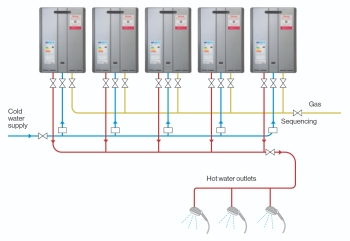A large 72 room care home in Surrey with a 123-person occupancy needed to reduce its operational carbon emissions by 20% but maintain a generous hot water supply during peak periods. The owner-operators also needed to re-structure both the operational costs and energy usage.
The Rinnai Design Team sized this commercial care home site by taking into account the peak periods of hot water usage in the morning and early evening. The Rinnai Design Team provided the customer with three options based on the carbon production, energy usage and operational costs. The new options were also compared to the existing, traditional storage system.
The options included a Rinnai H1 gas-powered system of three N1600 Continuous Flow Water Heaters. Secondly, a Rinnai H2 hybrid system, made up of two 21kW heat pumps and three continuous flow N1300s. Thirdly a Rinnai H3 all-electric solution that utilizes two 50kW heat pumps and two 48kW E-cylinders.
Over five years the costs of each hot water system were clearly shown:
- the Rinnai H1 natural gas system is the most cost effective at £52,806.30.
- the Rinnai H2 hybrid system is at £56,745.84.
- the Rinnai H3 all electric system amounted to £149,666.32 - The huge gap here is explained by electricity costing around 300% more than gas.
Rinnai’s decarbonising hot water solutions are represented in the colours grey (H3 all electric), orange (H2 hybrid) and blue (H1 natural gas), whilst the currently installed gas system is highlighted in yellow. The first graph demonstrates the operational costs associated with each system.
As reducing 20% of emissions was a key part of the customers ‘must-do’ objectives, all suggested systems are proven to perform to a cleaner standard than the existing traditional system. The Rinnai H1 natural gas, Rinnai H2 hybrid and Rinnai H3 all electric systems offer carbon reductions of 14.9%, 30% and 67.5% respectively.
The following graph depicts the energy savings to be made:
- the Rinnai H1 natural gas system offers a 14.9% reduction.
- the Rinnai H2 hybrid system sees a 27.1% reduction.
- the Rinnai H3 all electrical system yields a 39.7% reduction.
The care home decided that the preferred solution for this particular property would be the H2 hybrid hot water system. The H2 system would offer a reduction in emissions by at least 20%, as well as reducing the initial investment and forecasted operational expenditure by 21.7% and 62.1% respectively, when compared to the H3 all electric system.
Rinnai’s design team offers all UK customers a report and calculations on carbon and cost comparisons to other systems and fuels. For more information on FREE customer services visit Rinnai’s website at: www.rinnai-uk.co.uk.
Rinnai continues to provide UK customers with a variety of low carbon and cost-effective technologies that encourage commercial and domestic decarbonisation. No matter the specific requirements of any site, Rinnai can offer the ideal customer solution.

